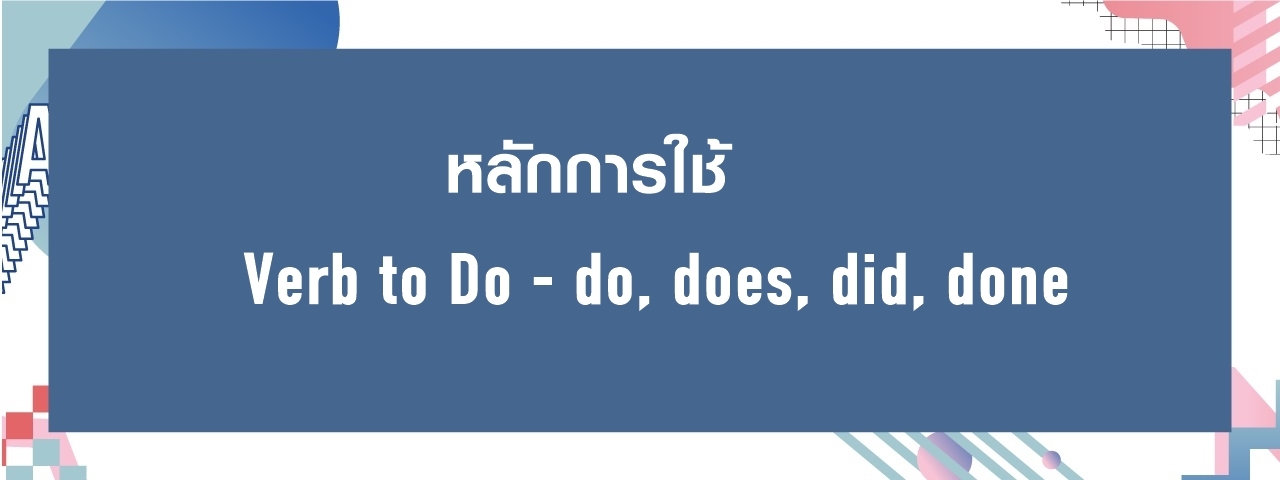

 1,575,758 Views
1,575,758 Views
รูปของ Verb To Do ในแต่ละ Tenses (กรณีที่ Do เป็นกริยาหลัก)
|
ประธาน |
Present Tense |
Past Tense |
Prefect Tense |
Continuous Tense |
|
I, You, We, They |
do |
did |
have/had done |
are/were doing |
|
He, She, It, John, Sarah, a dog |
does |
did |
has/had done |
is/was doing |
1. Verb to Do ทำหน้าที่เป็นกริยาหลัก (Main Verb) มี 4 รูปแบบ คือ
1.1. ใช้ใน Present Tense : Do / Does
Do ใช้กับประธาน I, You, We, They เช่น
I do my homework in the evening. (ฉันทำการบ้านตอนเย็น)
They do a lot of work around the town. (พวกเขาทำงานมากมายรอบเมือง)
Does (คือ do เติม es) ใช้กับเอกพจน์บุรุษที่ 3 เช่น He, She, It, Peter, Mother, a dog
He does his work diligently. (เขาทำงานอย่างขยันขันแข็ง)
She does nothing all day. (เธอไม่ทำอะไรเลยตลอดทั้งวัน)
1.2. ใช้ใน Past Tense : Did
Did เป็นรูปอดีต (Past Tense) ของทั้ง do และ does
I did my homework yesterday. (ฉันทำการบ้านเมื่อวานนี้)
Tom did everything he could to help. (ทอมทำทุกสิ่งที่เขาสามารถช่วยได้)
1.3. ใช้เป็น Past Participle : Done
Done คือ Past Participle (Verb 3) ของ Do (Past Participle คือคำกริยาช่อง 3 ที่ใช้ใน Prefect Tense)
I have done all the hard work. (ฉันทำงานหนักมาตลอด)
Tom has done the artwork. (ทอมทำงานด้านศิลปะ)
1.4. ใช้ Verb to do แทนที่คำกริยา
บางครั้งเราก็ใช้ Verb to do แทนที่คำกริยาเมื่อมีความหมายที่ชัดเจน และส่วนใหญ่จะใช้ในการพูดอย่างไม่เป็นทางการ
I’ll do the bathroom if you do the lawns. (ฉันจะทำความสะอาดห้องน้ำถ้าคุณตัดหญ้าที่สนามหญ้า)
do ในประโยคนี้ตัวแรกแทนกริยา clean (ทำความสะอาด) และตัวที่สองแทนกริยา mow (ตัดหญ้า)
Have you done the dishes yet? (คุณล้างจานหรือยัง)
done ในประโยคนี้แทนกริยา washed (ล้าง)
2. Verb to Do ทำหน้าที่เป็นกริยาช่วย (Auxiliary Verb) โดยจะใช้ร่วมกับกริยาหลัก (Main Verb) เพื่อสร้างประโยคคำถาม, ประโยคปฏิเสธ หรือเพื่อเน้นย้ำความสำคัญ
ข้อควรระวัง: กริยาช่วย Do จะไม่ใช้ในประโยคที่มี Verb to be หรือ Modal Verb (can, must, might, should, etc….)
2.1. ในประโยคคำถาม ใช้ Do, Does, Did มาวางไว้ต้นประโยค หน้าประธาน
ประโยคคำถามที่เป็น Simple Present Tense ใช้ Do / Does
Do you come from England? (คุณมาจากประเทศอังกฤษใช่ไหม?)
Does she like sport? (เธอชอบกีฬาใช่ไหม?)
ประโยคคำถามที่เป็น Past Tense ใช้ Did
Did you always take the bus to school? (คุณนั่งรถบัสไปโรงเรียนเป็นประจำใช่ไหม?)
Did Tom like the movie? (ทอมชอบภาพยนตร์ใช่ไหม?)
ข้อสังเกต: ในประโยคคำถาม Does, Did ที่ประธานเป็นเอกพจน์บุรุษที่ 3 คำกริยาหลักจะเป็นรูปพื้นฐานไม่เติม s เช่น Does she like sport?, Did he speak English?
นอกจากนี้เรายังใช้ do, does, did กับประโยค Wh – Questions (what, where, when, why, who, how, how many, how much.) ได้ด้วย เช่น
What does he think? (เขาคิดอะไร?)
When do you wake up? (คุณตื่นนอนเมื่อไหร่/กี่โมง?)
Where do you want to go? (คุณอยากไปที่ไหน?)
How much do you weigh? (คุณหนักเท่าไหร่?)
2.2. ในประโยคปฏิเสธ
รูปปฏิเสธของ do คือ do not (don’t)
รูปปฏิเสธของ does คือ does not (doesn’t)
รูปปฏิเสธของ did คือ did not (didn’t)
Doesn’t – Don’t ใช้กับประโยคปฏิเสธใน Present Tense
I don't like sport. (ฉันไม่ชอบกีฬา)
He doesn't like sport. (เขาไม่ชอบกีฬา)
Didn’t ใช้กับประโยคปฏิเสธใน Past Tense โดยใช้ได้กับประธานทุกตัว (I, You, We, They, He, She, It)
I didn't know you were coming. (ฉันไม่รู้ว่าคุณกำลังมา)
He didn’t go on holiday last year. (ปีที่แล้วเขาไม่ได้ไปพักผ่อนในวันหยุด)
2.3. การใช้ Verb to Do เพื่อเน้นย้ำความสำคัญ
บางครั้งเราใช้ do, does, did ในประโยคบอกเล่าเพื่อเน้นย้ำความสำคัญเป็นพิเศษ โดยเวลาพูดจะเน้นเสียงที่ do, does, did เช่น
Sarah does have a lot of friends. (ซาร่ามีเพื่อนเยอะมาก)
(ซึ่งเราอาจจะแปลกใจที่ซาร่ามีเพื่อนเยอะ เลยเน้นคำที่ does)
I do want to go Italy. (ฉันอยากไปอิตาลี)
(เน้นที่ do เพื่อย้ำว่าฉันอยากไป)
He does work hard. (เขาทำงานหนัก)
(เน้นที่ does เพื่อย้ำว่าทำงานหนัก)
I did lock the door. (ฉันล็อกประตูแล้ว)
(เน้นที่ did เพื่อย้ำว่าล็อกประตูแล้ว)
**Did ใช้ในประโยคบอกเล่าที่เป็น past tense กริยาหลักจะอยู่ในรูปพื้นฐานหรือกริยาช่อง 1
